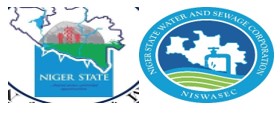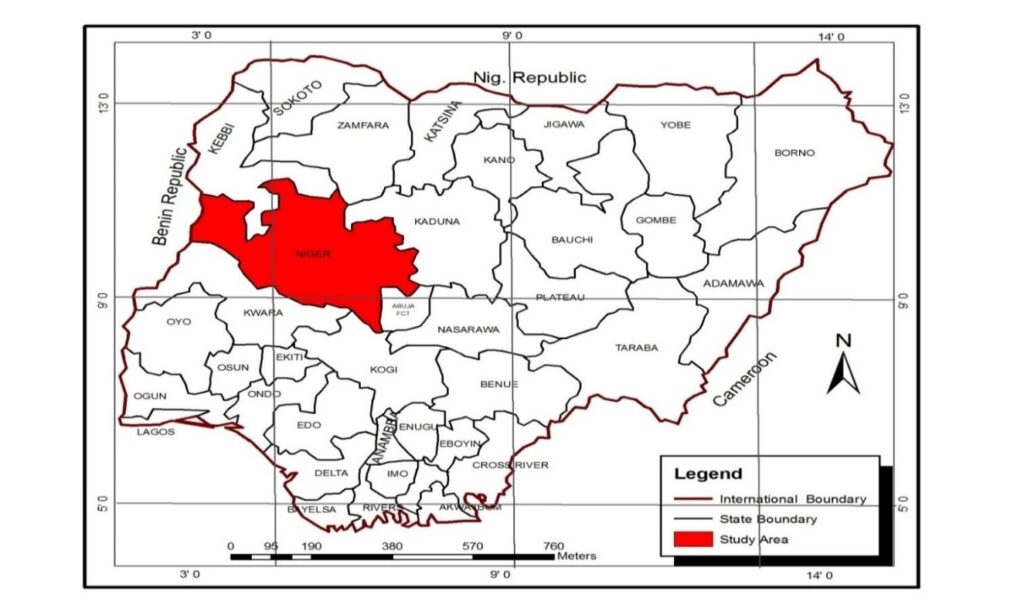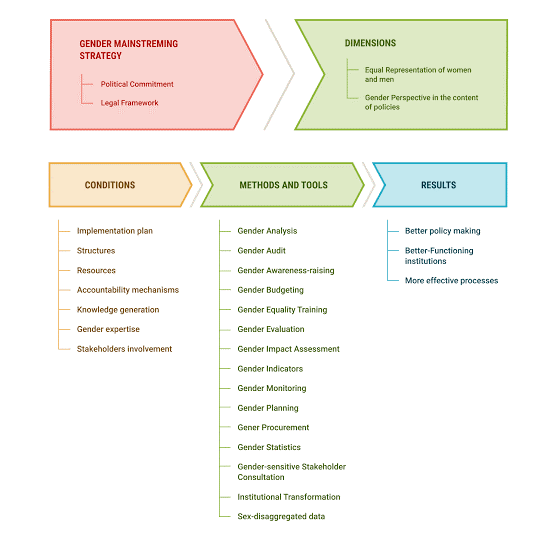Validate Gender Policy for NISWASEC

VALIDATED GENDER POLICY
FOR
NIGER SATE WATER AND SEWAGE CORPORATION.
Contents
1.1 National Policy on Water and Sanitation. 4
1.2.1 History and background. 5
Fig 1. Map of Nigeria showing Niger state. 6
Table1. Projected Population of 5 Urban towns. 6
2.0 Niger State Water and Sewage Corporation. 7
2.0.1 Vision and Mission of NISWASEC. 7
Figure2 Gender Mainstreaming Strategy. 8
2.0.4 Purpose of the Policy. 9
2.0.5 Objective of the Policy. 10
3.0.1 Policies and Gender Equity. 10
3.0.2 Human Resources and Capacity Development. 11
3.0.3. Partnerships, Communication and Influencing. 12
3.0.4 Monitoring and Evaluation. 13
4.0.1.1 All NISWASEC’s employees and related personnel; 13
4.0.1.2 Assistant General Manager’s (AGM’s) and Human Resource. 13
4.0.1.3 NISWASEC’s Staff, Affiliates and Partners. 14
1.0 Country Background
The Federal Republic of Nigeria has a total surface area of 923,768 km2 and comprises 36 states and its Federal Capital Territory, Abuja. It shares land borders with Niger Republic to the north, the Republic of Benin to the West, Chad and Cameroon to the East, while its coast to the south lies on the Gulf of Guinea in the Atlantic Ocean. By the reckoning of the United Nations, Nigeria as at 2015, has a population of 183,523,432 people and it is estimated that by the year 2045, thirty years on as from now, with an annual growth rate of 3.5%, the population would have risen to 394,380,709 which is more than twice the present population.
Water is one of the most important natural resource and Nigeria is considered to be abundantly blessed with water resources. Water is a basic natural resource for socio – economic development. It is fundamental for various social and economic development activities such as industrial production, irrigated agriculture, livestock farming, mineral processing, hydropower production, navigation, recreation and tourism. According to the Constitution of the country, every Nigerian has the right to adequate water and sanitation, nutrition, clothing, shelter, basic education, and health care, as well as physical security and the means of making a living (Draft National Policy, 2016).
A large percentage of the country’s population which is estimated to be in the neighborhood of 120 million does not have access to potable water. It is estimated, according to Multi-Indicator Cluster Survey of 1999 by the Federal Office of Statistics, that only 52% of the urban (48% of peri-urban areas are included) and 39% of rural dwellers have access to potable water. The institutional arrangement for water resources development and management is such that all tiers of government, that is Federal, States and Local Government are involved (National Water Policy, 2004).
1.1 National Policy on Water and Sanitation
The Water Resources Policy of Nigeria is a statement of the Government’s philosophy and objectives for the nation’s freshwater and possibly marine water resources including its strategies for achieving its set goals. In Nigeria, water is undoubtedly the most important natural resource the country has (not oil as usually misconstrued) and is unfortunately the most undervalued and neglected natural resource. In no part of Nigeria is freshwater of sufficient quantity and quality that it can continually be misused, abused and mismanaged in the way it has been in past decades without future dire consequences arising.
Nigeria’s first draft Water Resources Policy was formulated in the year 2004 following the National Water Resources Master Plan studies in 1984 and 1993, the enactment of the Water Resources Decree 101 (Water Act 100 of the Federal Republic of Nigeria) of 1993 and the current Water Resources Management Sector Reform Programme which commenced in 1999. The 2004 draft policy was based on the philosophy and principles of Integrated Water Resource Management (IWRM) and despite subsequent redrafting is yet to be submitted to the Federal Executive Council for approval. This revised draft policy document that takes into account the new developments in the sector since including the review of the 1993 Water Resources Master Plan and the current Water Resources Master Plan prepared in 2013.
For years, water services in Nigeria used a “top-down and supply-side approach, which has failed in the country due to many reasons including poor community and other stakeholders’ participation; poor management of the infrastructure and inadequate financial resources. The availability of water in both quantity and quality is being severely affected by climate variability and climate change, with more extreme weather events. Demand is increasing as a result of population growth and other demographic changes (in particular urbanization) and agricultural and industrial expansion following changes in consumption and production patterns. Thus the demand is outstripping supply at critical times of the year or in years of low water availability (Draft National Policy 2016).
The over-all policy goal is encapsulated as: People, Environment, Water and Sustainable Development (PEWS). The inadequacy and imbalance in the water infrastructure development, population increase, urbanization rates amongst others have created a serious deficiency in the quality of life of an average Nigerian with its attendant consequence on sanitation, food, security, health, employment and standard of living. It is the recognition of these critical issues that has driven the development of the PEWS to facilitate the Nigerian water sector reform.
Among the specific objectives of the Policy is; to Improve governance, institutional development, capacity development and the advancement of gender mainstreaming in the water sector.
1.2 Niger state
1.2.1 History and background
Niger state is one of the 36 states in Nigeria. It was created in 1976, situated in the North central Geo-Political zone with the largest land mass covering about 86,000km2. Its population has steadily risen to 3,950,249 as at 2006 Population census. Niger State Water Board was created in 1976 through Act No. 6 with the mandate of supplying water to 5 urban towns across the state which include; Minna, Suleja, Bida, Kontagora, New Bussa and 54 Urban and 52 Bi-water schemes with the mandate to supply potable water to residents of the area 24 hours a day, 7 days a week. On 25TH March,2020. A new Law came into being creating Niger State Water and Sewage Corporation (NISWASEC) with the mandate of supplying Water to 5 urban towns of Niger state namely; Minna, Suleja, Bida, New-Bussa and Kontagora.
Fig 1. Map of Nigeria showing Niger state

Table1. Projected Population of 5 Urban towns
LGA | Population Census (2006) | Population Projection (2016) | Population Projection (2019) |
Minna | 350,287 | 345,000 | 506,000 |
Suleja | 215,075 | 302,200 | 310,682 |
Bida | 185,553 | 260,700 | 268,036 |
Kontagora | 151,968 | 213,500 | 291,522 |
New bussa | 172,835 | 241,455 | 249,665 |
Source: Niger State Bureau of Statistics, 2017 Edition
2.0 Niger State Water and Sewage Corporation
NISWASEC recognizes that gender relations and inequalities are fundamental causes of poverty. Women and girls do not enjoy the same status, power or access to and control over resources as men and boys. Principles of equity, inclusion and social justice require us to work to ensure that everyone has equal opportunity for expressing and using their potential, irrespective of sex, age, class, religion, ethnic background, sexual orientation, medical status or disability. The present reform happening in the water sector in Niger state is inclusive of a gender perspective; working with a gender perspective means involving and engaging men and boys, women and girls including people living with disability in order to improve their status.
2.0.1 Vision and Mission of NISWASEC
To achieve NISWASEC vision of becoming a world class utility, we need to provide services to ALL in the urban areas of Niger state. The Gender unit will ensure the strength and attributes of both men and women are used to full advantage to achieve the mission and vision of NISWASEC.
2.0.2 GESI in NISWASEC
The integration of GESI has forged the way to ensure NISWASEC is better able and equipped to provide services towards equity in terms of access and use of WASH services. GESI is a concept that addresses improving access to livelihood, human capital resources, financial resources and services for ALL, including women, poor, disabled and excluded. It supports more inclusive policies and mindsets and increases the voice and influence of all including the women, poor, disabled and excluded.
2.0.3 GESI Principles
NISWASEC recognizes the need to reverse the systemic exclusion of groups from social, political and economic activities. NISWASEC GESI policy offers a guide on how to integrate gender-responsive approaches, essential actions to be taken to ensure the integration of gender.
Figure2 Gender Mainstreaming Strategy

GESI will also contribute to greater equity in society beyond WASH by ensuring the implementation of the “do no harm” principle; and ultimately to the realization of the ambition of leaving no one behind by 2030.
2.0.4 Purpose of the Policy
The vulnerable facet of the society suffers the most from lack of access to services. In addition, women bear an unfair burden, not only in performing household water, sanitation and hygiene related activities, but also in coping with waterborne diseases in their families. Thus, reforms in the sector should aim to provide access to water and sanitation in an equitable manner, while balancing economic and social considerations.
In line with the Niger State WASH sector Policy, there is a need to have a NISWASEC specific gender policy. The WASH policy was approved by His Excellency the Executive Governor of Niger state, Alhaji Abubakar Sani Bello on 12th February, 2020 Section 5:6 of the WASH sector policy provides for Gender Integration and Social Inclusion. The policy states; “In Niger State majority of people fetching water for domestic use are adult women and female children. Consequently, the Niger State Government shall adopt the policy of gender integration and social inclusion (GESI), with respect to policy making, planning and implementation of water supply and sanitation interventions in the State. Specific steps to be taken will include: Selection of committees on water supply and sanitation in the State and LGAs shall be gender sensitive; Training of top management staff in the sector on gender equity and social inclusion in water and sanitation projects; Membership and leadership positions in WASHCOM shall be equitably distributed among men and women; Women should be trained in such areas as sani-center operations and other technical areas to enable them benefit from available opportunities”.
To support the current reform program, there is need for a gender policy to be in place, the management of NISWASEC with support from USAID/EWASH – (Effective Water Sanitation and Hygiene) established a Gender and Pro-Poor Unit (G&PPU) on 18th November, 2019 to be managed by a focal person, the essence is to integrate gender and social inclusion into NISWASEC programs and operations.
2.0.5 Objective of the Policy
The main objective is to empower women, and be socially inclusive of all, foster the Integrated Water Resource Management (IWRM) for sustainable, efficient, and equitable water resources development and management in order to meet the current and future user water demand in Niger state. This is to be done involving all the stakeholders particularly Governments at all levels, the communities, the private sector and Civil Society Organizations. It is also hoped that the policy will lay the foundation for gender integration in planning, implementation and monitoring services in NISWASEC.
2.0.6 Policy Target
To meet the objectives of the policy, NISWASEC needs to be fully entrenched in all the 5 urban areas of Niger state and should be operating successfully by the year 2021. Since each urban area has its own peculiarities with regard to water allocation priority, socio-culture of the communities, etc. An initial strategy should be developed for each Area Office as soon as possible. This policy will require accelerate action on the development of the strategy.
3.0 Implementation
3.0.1 Policies and Gender Equity
With the adoption of the new policy, NISWASEC will put in place the following implementation strategies;
- Ensure policies -WASH policies, human resource (HR) policies/manual and institutional practices are developed with a gender lens.
- Have a functional Gender Unit in NISWASEC with Gender Desk Officer/Gender Focal Person (GFP) in all Area Offices.
- Take all measures to prevent and respond to all forms of sexual harassment and violence, and sexual exploitation and abuse of vulnerable adults, promote staff awareness and training, and effective systems for reporting and monitoring.
- Institute a pathway for reporting gender based violence – including sexual harassment, coercion and exploitation in the workplace and applicable sanctions.
- Ensure needs of staff such as – maternity/paternity leave, staff relocation allowance, travel of Nursing mothers with their baby and nanny, crèche, female safe space, menstrual hygiene management in the workplace, sick leave, and school run are well articulated, documented and operationalized.
- Inclusiveness and non-discrimination, promotion into senior and mid- level management positions based on set down requirements.
- Leadership and a supportive environment for representation, participation in decision making process for WASH service provision.
3.0.2 Human Resources and Capacity Development
- Articulate how organizational function works across all domains of gender Integration and Social Inclusion framework and apply it to improve our GESI transformative potential.
- Ensure gender inclusiveness in hiring process for women, men, youth including people with disabilities.
- Gender and diversity balance in staffing and management structures along with average pay levels.
- Staff development on GESI and WASH, new staff orientation package to be inclusive of GESI learning.
- Undertake capacity building (e.g. resource allocation, training, information, networking).
- Recruit and retain staff with a commitment to gender equity; build staff and partner capacity and skills in Gender Integration and Social Inclusion and diversity, and ensure all annual operating plans, job descriptions and performance plans reflect NISWASEC’s commitment to gender equity.
3.0.3. Partnerships, Communication and Influencing
- Form partnerships with women’s rights organizations and movements to collaborate in the achievement of shared goals and elevate the voice of marginalized people; and engage key stakeholders in the struggle for Gender Equity and Social Inclusion including other agencies, civil society, government, private sector, public and private donors.
- Engage men and boys in support of Gender Integration and Social Inclusion and women’s empowerment in line with organizational objectives.
- Ensure NISWASEC’s fundraising, advocacy, and communications respect and uphold our commitment to social justice and gender equity and social inclusion including being respectful, using inclusive and positive language and images and avoiding stereotypes with particular attention to those based on gender and diversity.
- Systematically negotiate with donors for adequate funding to meet NISWASEC’s National/International gender commitments (specifically addressing measures for “do no harm”/gender-based violence prevention measures, prevention of Sexual Exploitation and Abuse (PSEA), and organizational Gender Equity and Diversity (GED).
3.0.4 Monitoring and Evaluation
- Systematically collect sex disaggregated data and incorporate mandatory use of gender disaggregated data by sex, age, disability, and other relevant diversity factors to inform actions across service provision.
- Ensure assessments and evaluations and do no harm reviews are participatory and assess progress towards gender equity.
- Conduct an annual Gender Analysis (GA) with a component on Gender equity scorecard and implement recommendations.
- Annual reporting on GESI progress, including innovations and stories of change.
- Ensure documentation of best practices, challenges and create mechanisms for cross-learning within other state sister agencies and partners.
- Ensure the use of modern technology such as; GIS, system radio communications, billing and accounting software, flow temperatures and level monitors.
4.0 Mode of Application
This policy applies across NISWASEC employees and related personnel at Headquarters and area offices.
4.0.1Responsibilities
4.0.1.1 All NISWASEC’s employees and related personnel
It is the responsibility of all NISWASEC employees and related personnel to own this policy and uphold core values of the organization.
4.0.1.2 Assistant General Manager’s (AGM’s) and Human Resource
All Directors of NISWASEC, employees and related personnel should understand and comply with the principle of this policy. Human Resource is also responsible for robust recruitment, induction, and training as per commitments of the core principles above, whilst Directors are responsible for performance management to ensure the implementation of the policy.
4.0.1.3 NISWASEC’s Staff, Affiliates and Partners
NISWASEC staff, affiliates and partners are responsible for defining work plans and procedures to uphold and operationalize this policy. They are also to ensure this policy is implemented, monitored and reported against every two years to the Governing Board of the Corporation.
Management will provide the necessary support to all forms of NISWASEC engagement including Headquarter, and Area Offices. Effective resourcing should be carried out by Management and Board of NISWASEC to ensure both Headquarter and Area Offices have in place the resources to implement this policy.
4.0.1.4 Gender Unit
NISWASEC through the Gender Desk or Gender Unit will coordinate oversight of this policy, review and update as required. The Gender main unit will provide support to the area offices on the collection and analysis of reporting against the policy.
5.0 Associated Policies
This policy is complementary to the set of standards of behavior that all NISWASEC employees are required to adhere to in NISWASEC code of ethics and any further codes or related policies defined by NISWASEC Board, Affiliates, and Partners.

